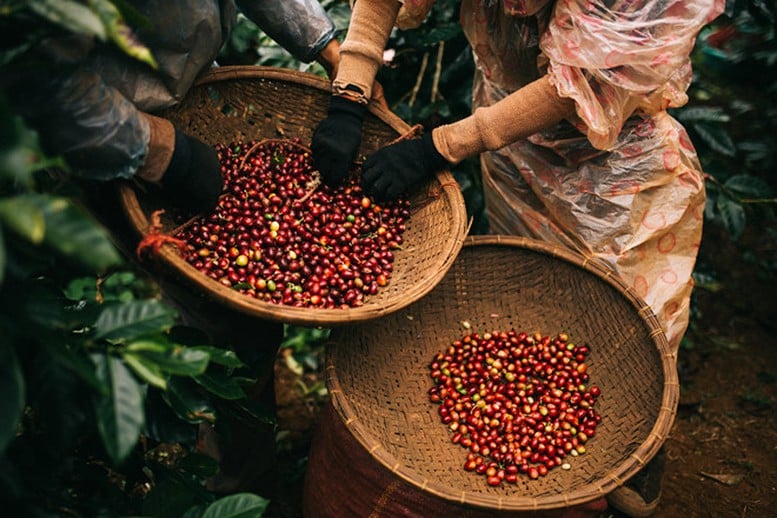
Access to sustainable production chains, quality and green growth has helped Vietnamese coffee affirm its position in the global market.
Challenges in coffee quality management
In 2024, Vietnam's coffee exports will reach 1.32 million tons, with a turnover of 5.48 billion USD, down 18.8% in volume but up 29.11% in value compared to 2023. The average export price will reach 4,151 USD/ton, up 56.9%, showing that the added value of Vietnamese coffee is being enhanced thanks to sustainable production and better quality.
Despite its great potential, the Vietnamese coffee industry is facing many challenges in sustainable development. One of the most prominent issues is the management of waste from coffee production, including fruit peels, coffee grounds, processing wastewater, fertilizer packaging and pesticides.
According to the Department of Crop Production and Plant Protection, waste collection and treatment are currently limited due to low public awareness, unsynchronized treatment technology and lack of effective support policies. Improperly treated waste causes environmental pollution, land degradation and greenhouse gas emissions, especially from processing and transportation.
The unreasonable use of chemical fertilizers and pesticides also causes an imbalance in the soil microflora, which has long-term effects on the quality and productivity of coffee plants.
Mr. Nguyen Hoang Phuc, Deputy Director of the Department of Agriculture and Environment of Lam Dong, said that every year, farmers in this province use more than 350,000 tons of fertilizer, of which inorganic fertilizer accounts for over 200,000 tons. Without proper collection and treatment measures, waste from fertilizers and pesticides will have a negative impact on the ecological environment.
To address these challenges, the National Agricultural Extension Center emphasizes that ensuring responsible use of agricultural inputs and effective waste treatment is a long-term process, requiring synchronous changes from policy to producer behavior.
To promote sustainable coffee production, many units under the Ministry of Agriculture and Environment have implemented many practical activities. Typically, in 2024, the National Agricultural Extension Center organized 12 training courses for 360 students in 4 provinces of the Central Highlands, focusing on advanced weed management, good coffee cultivation, health and safety, and occupational safety. These courses not only improve the skills of agricultural extension officers and farmers but also strengthen the community agricultural extension network, helping to spread knowledge to production households.
These programs have equipped farmers with the knowledge and skills necessary to adopt sustainable farming practices, manage agricultural inputs effectively, and handle primary waste at the household level. Community extension workers have also been empowered to act as an important link between regulators and producers.
Lam Dong Province, with a coffee area of about 176,000 hectares and an output of nearly 600,000 tons/year, is one of the leading localities in sustainable coffee production. The province has developed more than 86,000 hectares of coffee with certifications such as organic, VietGAP, 4C, meeting export standards. Mr. Nguyen Hoang Phuc said that the provincial leaders always focus on safe and sustainable agricultural production through specific resolutions and programs, ensuring the quality of coffee products to meet the international market.
A typical example is Binh Dong Farm in Loc Ngai Commune, Bao Lam District, Lam Dong. With a cultivated area of 111 hectares, of which 90 hectares are used for coffee, Binh Dong Farm has transformed from traditional production to a high-quality, organic and environmentally friendly coffee model. The farm does not use herbicides, balances nutrients between organic and inorganic fertilizers, and improves processing procedures to minimize environmental impact.
According to Mr. Nguyen Thanh Loc, CEO of Binh Dong Farm, the coffee husks after processing are composted with biological products for 3-5 months to fertilize the plants. Wastewater from the coffee washing process is treated through 3 settling ponds combined with microorganisms, then reused to water the plants. Thanks to applying this model, coffee productivity has increased from 3-4 tons/ha to 5-6 tons/ha, and quality has improved significantly with higher sugar content in the fruit. Binh Dong Farm's products have been exported to demanding markets such as Türkiye, Belgium, New Zealand and South Korea, attracting an increasing number of international customers.
Mr. Le Quoc Thanh, Director of the National Agricultural Extension Center, emphasized that access to sustainable production chains, quality and green growth has helped Vietnamese coffee affirm its position in the global market.
However, the coffee industry also faces price fluctuations due to international factors. In early April 2025, coffee prices in the Central Highlands dropped sharply from VND132,000/kg to VND116,000-118,000/kg after the US government announced a reciprocal tax. By April 10, when the US postponed the tax for 90 days, coffee prices recovered to VND119,000/kg and reached VND132,000/kg on April 16.
Coffee market expert Nguyen Quang Binh said that the devaluation of the US dollar and the demand for export to the US were the main reasons for the increase in coffee prices. However, he predicted that prices would be difficult to reach the previous peak due to increased supply from Brazil and Indonesia, along with the caution of speculators in the face of unpredictable US policies.
According to Deputy Minister of Agriculture and Environment Hoang Trung, to achieve the export target of 6 billion USD by 2030, the Vietnamese coffee industry needs to focus on strategic directions. Firstly, not expanding the area but prioritizing replanting and renovating old coffee gardens to increase productivity and quality. Secondly, promoting sustainable production, applying 4.0 technology, digital transformation and developing specialty coffee, meeting the strict standards of the EU, US and Japanese markets. Thirdly, building a high-quality coffee value chain, connecting farmers, cooperatives and businesses to diversify products and increase added value. Finally, strengthening policies to support waste management, responsible use of agricultural materials and environmental protection, ensuring sustainable development of the coffee industry in terms of economy, society and environment.
Do Huong
Source: https://baochinhphu.vn/xay-dung-chuoi-san-xuat-ca-phe-ben-vung-102250418073804694.htm




![[Photo] Many young people patiently lined up under the hot sun to receive a special supplement from Nhan Dan Newspaper.](https://vphoto.vietnam.vn/thumb/1200x675/vietnam/resource/IMAGE/2025/5/18/6f19d322f9364f0ebb6fbfe9377842d3)
![[Photo] Ready for the top competitions of Vietnamese table tennis](https://vphoto.vietnam.vn/thumb/1200x675/vietnam/resource/IMAGE/2025/5/18/9c547c497c5a4ade8f98c8e7d44f5a41)










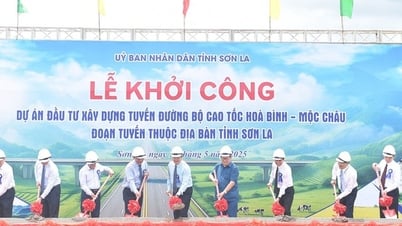







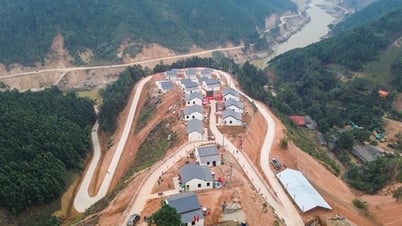
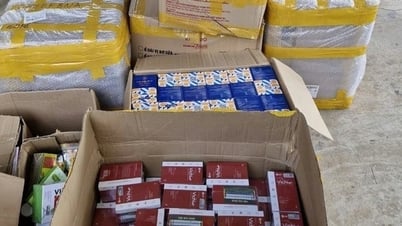

![[Photo] General Secretary To Lam visits exhibition of achievements in private economic development](https://vphoto.vietnam.vn/thumb/1200x675/vietnam/resource/IMAGE/2025/5/18/1809dc545f214a86911fe2d2d0fde2e8)
![[Photo] National conference to disseminate and implement Resolution No. 66-NQ/TW and Resolution No. 68-NQ/TW of the Politburo](https://vphoto.vietnam.vn/thumb/1200x675/vietnam/resource/IMAGE/2025/5/18/adf666b9303a4213998b395b05234b6a)














































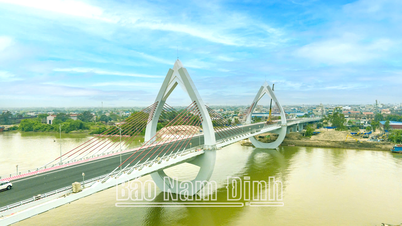








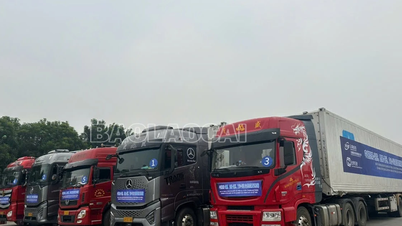










Comment (0)